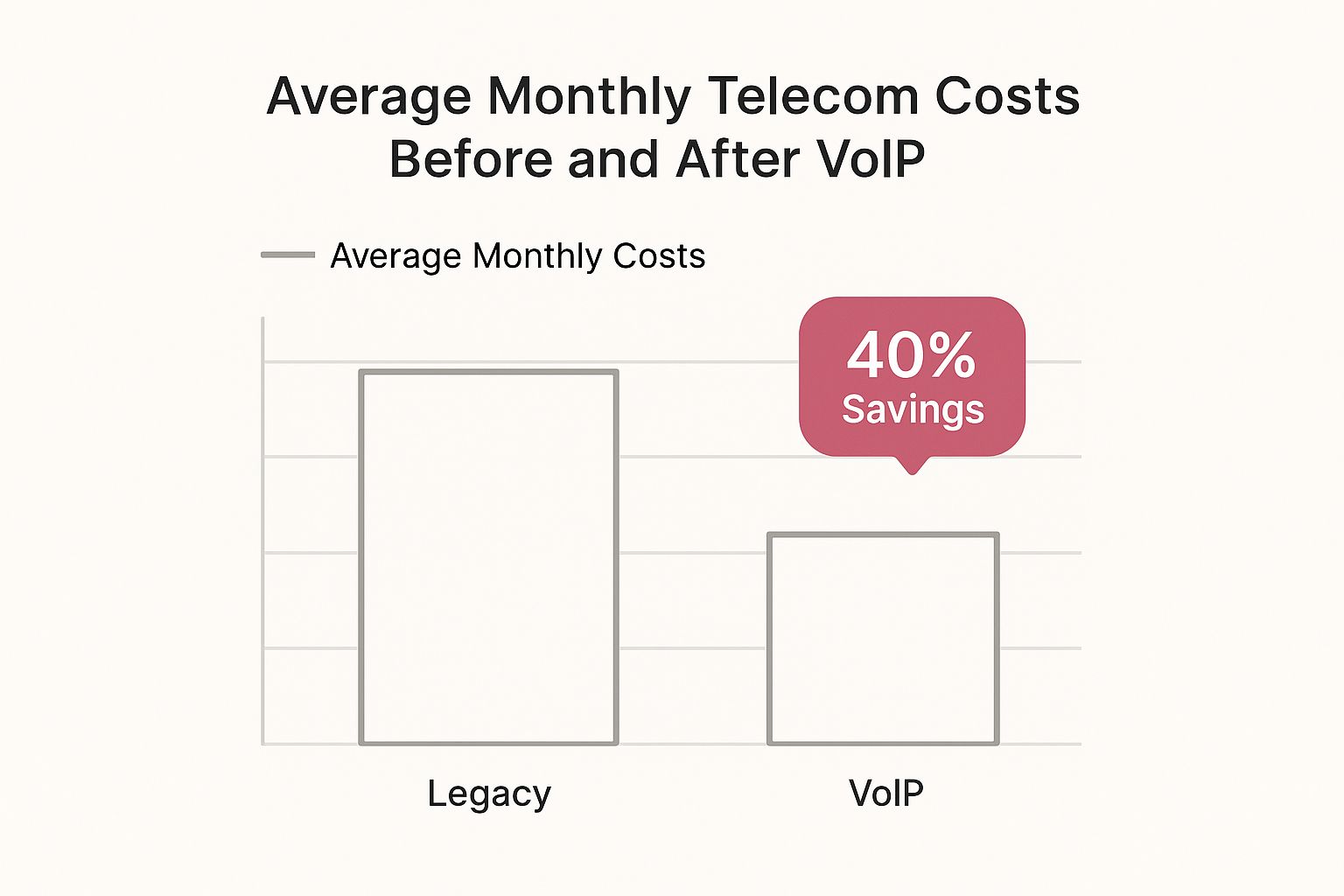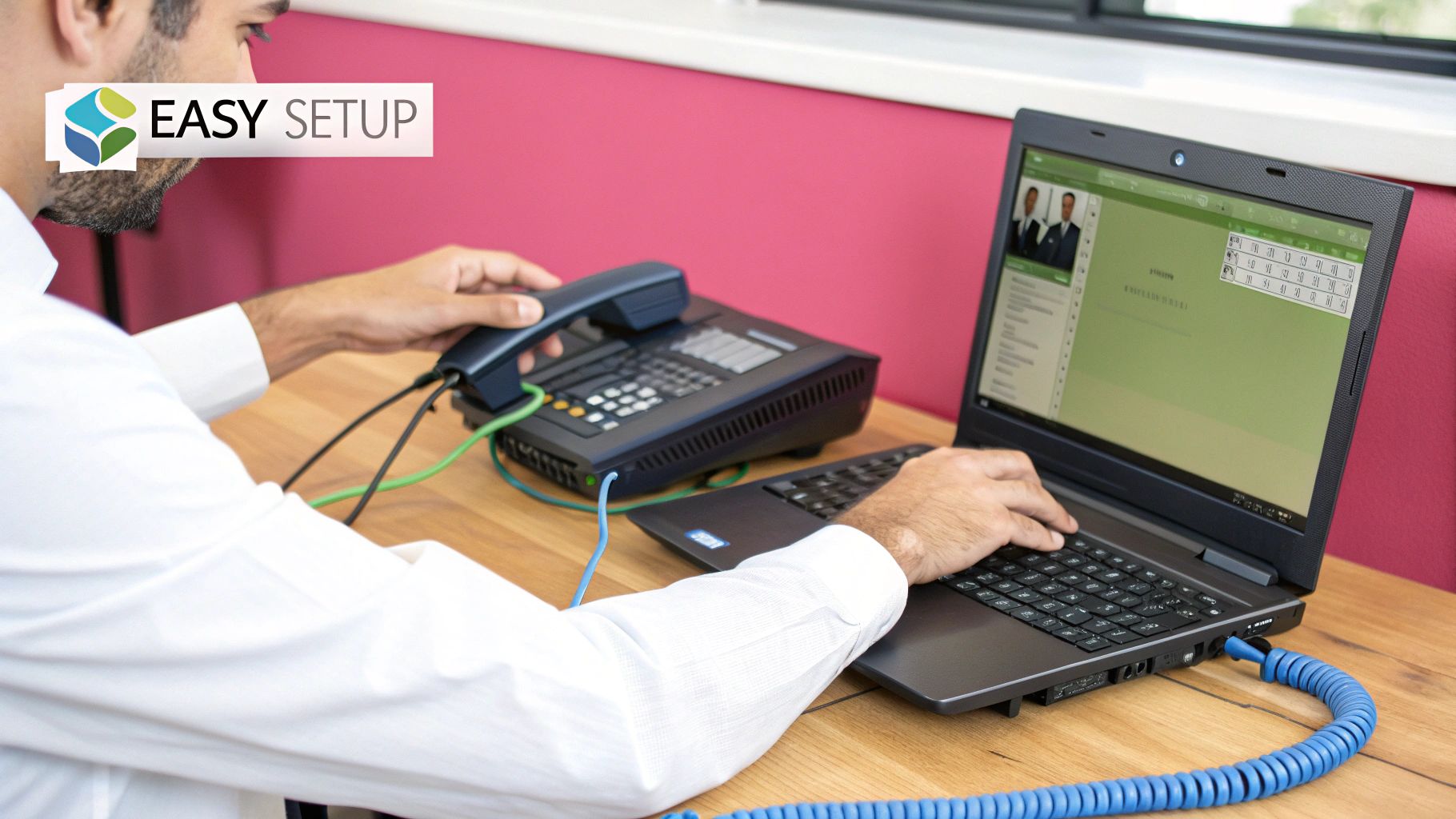Discover how voice over IP phone systems for business can boost your UK company's communication. Learn more about our reliable, cost-effective options.
The looming 2025 PSTN switch-off is a huge moment for UK businesses. It means voice over IP phone systems are about to become the new normal for professional communication. Think of it this way: for years, we’ve relied on a dedicated courier to post a letter, but now we can send an instant, flexible email. This guide will give you a clear roadmap to navigate the change with confidence.

The old-school phone network, the Public Switched Telephone Network (PSTN), is being retired. This system, which runs on ageing copper wires, is giving way to a fully digital infrastructure. It's not just a technical update; it's a genuine opportunity for professional services firms to completely modernise how they speak to their clients. For example, a law firm can move from a clunky, desk-bound system to a flexible one that allows solicitors to take client calls securely from any location.
Voice over IP (VoIP) is the technology at the forefront of this change. Rather than using a physical line, VoIP routes your calls over your internet connection. It’s a simple shift in theory, but one that unlocks a whole new world of functionality and efficiency that traditional phone systems simply cannot match.
This is not just a fleeting trend. The move to VoIP is a nationwide migration, backed by regulators like Ofcom. The transition gives businesses a chance to improve how they operate with features that are perfect for modern work, including remote and hybrid models.
It’s like swapping a basic mobile phone for the latest smartphone. The core function—making a call—is the same, but the possibilities are worlds apart.
One of the biggest wins with VoIP is how well it integrates your communications. For a professional services firm, this means you can link your phone system with your other critical tools, creating a much smoother and more productive workflow for the whole team.
The market's growth proves how widespread this adoption is becoming. The UK VoIP market is expected to hit £3.78 billion by 2026. And yet, a startling 45% of UK businesses still do not know the PSTN switch-off is even happening, which shows just how urgent preparation is. You can explore the full research on these VoIP statistics to see the sheer scale of the shift.
This guide is designed to take the mystery out of VoIP, showing you exactly how it can:
By getting to grips with the fundamentals now, you can ensure your business isn't just ready for 2025—you’ll be perfectly placed to gain a real competitive edge.

To really grasp why voice over IP phone systems for business are such a game-changer, it helps to look at what’s happening behind the scenes. In simple terms, VoIP takes your voice and converts it into tiny digital data packets. Imagine your conversation being neatly broken down into thousands of secure parcels.
These little parcels then travel across the internet—the very same network you use for sending emails or browsing the web. When they arrive at their destination, they’re instantly put back together in the right order, so the person you’re talking to hears you loud and clear.
It’s a bit like swapping a dedicated, single-track railway line (the old phone network) for a smart, multi-lane motorway (the internet). The motorway is faster, more efficient, and can handle a whole lot more traffic at once.
This digital-first approach is far more flexible and powerful than old-school telephony. It frees your phone number from a specific physical line, tying it instead to your user account. What does this mean? Your business number can follow you anywhere there's an internet connection.
For a professional services firm, the real-world impact is huge. A solicitor, for example, can take a call from their direct office line on a laptop while working from home. A few minutes later, they could be on a video call with a client, with the entire conversation being recorded and logged for compliance—all through one unified system.
This simple shift breaks down the walls between different ways of communicating, pulling them all under one roof. It’s not just about calls anymore; this technology helps businesses build a winning omnichannel communication strategy by blending voice with other channels for a seamless client experience.
Because VoIP runs on data networks, it can do so much more than simply carry your voice. This is where its true value for modern businesses really shines. It connects naturally with other digital tools, turning a basic phone call into an intelligent, data-rich interaction.
Think about a busy accountancy practice during tax season. When a client rings, the VoIP system can automatically do a few clever things:
This shift from analogue to digital isn't just a technical upgrade; it's about making business communication smarter, more efficient, and deeply connected to the software you rely on every day.
The ability to link different systems together creates powerful new ways of working. This digital foundation is central to understanding how VoIP is transforming business telephony and why stepping away from outdated copper wires is such a smart move for any firm focused on growth and exceptional service. It's a system built for how professionals work today.
When you move to a VoIP phone system, you’re not just changing your phones; you're making a strategic upgrade that directly impacts your bottom line and how your team operates. For professional services firms, the benefits really boil down to three things: serious cost reduction, incredible flexibility, and a much-improved client experience.
Let’s be clear, these are not minor tweaks. They are fundamental improvements to the way you do business.
The first thing most businesses notice is the drop in their phone bills. Traditional phone systems are notorious for high line rental fees and steep call charges, especially if you’re ringing internationally. VoIP neatly sidesteps all of that by running over your existing internet connection—the one you are already paying for.
This also marks a welcome shift from a capital expenditure model (buying pricey, on-site hardware) to an operational one, where you just have a predictable monthly subscription. It makes budgeting so much simpler.
For example, a marketing agency that frequently collaborates with international clients could save hundreds of pounds per month on call charges alone. The money once poured into maintaining an old, clunky phone system can be funnelled back into what actually grows your business, like new marketing initiatives or upskilling your team.

The financial upside is often backed by a big jump in productivity. We've seen studies showing that businesses making the switch see an average productivity bump of around 20%, while cutting their communication costs by up to 30%. This boost comes from all the smart features and the sheer adaptability that old phone lines just cannot compete with.
Before we dive into those features, let's compare the two systems side-by-side to see just how different they are.
This table breaks down the core differences between a legacy phone setup and a modern VoIP solution, highlighting why so many businesses are making the move.
As you can see, the comparison isn't even close. VoIP is built for the way we work today, offering a level of agility that traditional systems simply were not designed for.
Beyond the savings, the flexibility VoIP offers is a game-changer, especially with the rise of hybrid and remote working. Your business phone number is no longer chained to a desk. Instead, it’s linked to you, as a user, and you can access it from pretty much anywhere you have an internet connection.
This means your team can work effectively whether they’re in the office, at home, or on the road visiting a client. An employee can take their direct office line on a laptop using a softphone app, on their mobile, or on a sleek IP desk phone. The experience is seamless.
This location independence isn’t just a nice-to-have; it's a massive strategic asset. It lets you hire the best talent, regardless of geography, and builds a more resilient business that can pivot instantly without dropping a single call.
This is what keeps your team connected and collaborative, no matter where they log in from. Understanding the real-world benefits of VoIP phone systems for business is key to future-proofing your operations.
Finally, a good VoIP system gives you the tools to deliver a truly professional and responsive service. We all know first impressions count, and how you handle a phone call can completely shape a client's perception of your entire firm.
Features like auto-attendants and smart call routing ensure every single call is answered professionally and sent to the right person, right away.
Together, these features create a smooth, efficient, and reliable experience that reinforces your reputation for outstanding service and client care.

Beyond just making and taking calls, a modern voice over IP phone system for business is loaded with powerful tools that can genuinely improve how a professional services firm works. These aren’t just novelties; they're practical features that solve everyday problems, boost team productivity, and help you present a far more polished image to your clients.
When you're weighing up different providers, understanding these core functions is what really matters. It allows you to look past the price tag and find a system that will deliver real, tangible value to your team day in, day out. Let's dig into some of the features you cannot do without.
First on the list is the Auto-Attendant. Think of it as a perfectly professional and utterly reliable digital receptionist who works around the clock. It greets every caller with a custom, studio-quality message and offers a simple menu to get them to the right person or department ("Press 1 for Client Services, Press 2 for Accounts").
This one tool has a massive impact. It guarantees no call ever goes unanswered, providing a consistent and professional welcome even well outside of business hours. For a busy consultancy, this means a potential new client is always handled with care, instead of hearing an endlessly ringing phone.
Just by implementing this feature, you immediately elevate how clients perceive your firm's size and professionalism. It’s a clear signal that you’re an organised, client-focused operation.
Another vital feature, particularly for firms in regulated industries, is Call Recording. For a financial advisory practice, the ability to securely record and store client calls isn't just a handy tool—it's often a regulatory requirement for compliance with bodies like the FCA.
But compliance is just one side of the coin. Call recording is also a fantastic resource for training and quality control. A senior partner in a law firm can review calls from junior solicitors to offer constructive feedback on their client communication style, helping to maintain high service standards across the practice.
A robust VoIP system handles this seamlessly. Recordings are typically stored securely in the cloud, are easy to search for, and can be set to record all calls automatically or just on-demand. It gives you complete control and peace of mind.
For busy professionals who are constantly on the move, the Voicemail-to-Email feature is a genuine game-changer. Instead of having to dial into a clunky voicemail system and listen to messages one by one, this function sends an audio file of the voicemail straight to your email inbox.
Many advanced systems even provide a text transcription of the message. This is incredibly helpful for a consultant travelling between client sites. They can quickly scan the text to gauge its urgency without needing to find a quiet spot to listen to the audio. This simple shift allows for faster responses and much better time management.
Perhaps the most significant leap forward in business telephony is the idea of Unified Communications (UC). This is not a single feature, but rather the weaving of all your communication channels into one cohesive platform—with your VoIP system often sitting at the very centre.
It means your voice calls, video meetings, instant messaging, and team chats are all managed through a single application. This integration breaks down the frustrating silos between different communication tools, creating a much more fluid and collaborative work environment.
Imagine how an architectural practice might use this:
This seamless flow saves time, cuts down on confusion, and keeps projects moving forward. By choosing a voice over IP phone system for business with strong unified communications, you're not just upgrading your phones—you're investing in a more connected and efficient way of working.
When it comes to adopting new technology, the first question is always about the bottom line. So, how does a voice over ip phone system for business stack up financially? The great news is that the pricing structure is usually far more transparent and predictable than the old-school phone lines we're used to. Most providers have settled on a simple subscription model, which makes budgeting a whole lot easier.
This is typically a per-user, per-month fee. You pay only for the number of employees using the system, which gives you incredible flexibility to scale up or down as your team grows or changes. For most businesses, this predictable operational expense is a welcome change from the hefty, upfront capital investment that traditional phone systems demanded.
One of the first forks in the road you'll encounter is choosing your deployment model. It really boils down to two main choices: 'hosted' (also called cloud-based) and 'on-premise'.
Think about a 20-person recruitment agency. A hosted solution is a no-brainer. They get a predictable monthly bill, software that's always up-to-date, and expert support on tap. An on-premise system, on the other hand, would mean a massive initial cost and the ongoing headache of managing it.
While the monthly subscription is the main component, it’s smart to look at the complete financial picture. This includes any initial setup fees and the physical hardware your team might need to make and receive calls.
Hardware costs can be quite flexible. Many businesses still prefer dedicated IP handsets. They look just like a normal office phone but plug into your network instead of a phone socket. The alternative is a softphone—an application on a laptop or computer—which works perfectly with a good quality USB headset. This choice lets you equip your team based on how and where they work.
The key takeaway is that VoIP pricing is designed for clarity and scalability. The predictable monthly costs allow for better financial planning and remove the risk of unexpected maintenance bills that often come with older, on-premise hardware.
For small businesses in the UK, monthly VoIP services can start as low as £2.50 per user, with costs often decreasing per user as your organisation gets larger. One of the biggest perks is that, unlike traditional phone systems, a whole host of powerful features are usually baked into this price. Providers also build in robust failover solutions that can automatically reroute calls if your internet ever goes down, so you never miss that important client call. You can find more insights into how VoIP is transforming business telephony and the value it brings.
This built-in resilience is a crucial element of modern business continuity solutions, making sure your lines of communication stay open even when faced with an outage. By getting to grips with the straightforward pricing and choosing the right deployment model, you can find a system that fits your budget, resources, and future plans perfectly.
Switching your business over to a voice over IP phone system isn't something you do on a whim. A successful move hinges on good planning, ensuring the changeover happens with as little disruption to your daily work as possible. Let's break the project down into a series of clear, manageable steps.
The process actually starts long before you even think about picking a provider. First things first: look at your current internet connection. Because VoIP runs over the internet, the quality of your connection has a direct impact on the quality of your calls. A quick bandwidth test will tell you if your existing service can handle the extra traffic without annoying issues like dropped calls or jittery audio.
Once you’re confident your network is up to the task, it’s time to figure out exactly what you need from a new phone system. This means looking beyond just making and taking calls and thinking about which advanced features will genuinely help your team. Do you need call recording for training and compliance, or maybe an auto-attendant to greet and direct callers professionally?
With a clear checklist in hand, you can start looking at potential providers. A huge part of this conversation will be about number porting. This is simply the official process of moving your existing business phone numbers—the ones your clients already know—to the new VoIP service. Any good provider will handle this for you, making sure the switch is seamless and you do not miss a single call.
A classic mistake is getting caught up in the technology and forgetting about the people who have to use it every day. Proper staff training isn't just a nice-to-have; it's essential for getting your money's worth and making sure everyone can hit the ground running with the new features.
Let's walk through how a management consultancy with 30 employees might handle the move. Their transition to VoIP could follow a structured plan that any professional services firm can easily adapt.
By following a logical sequence like this, the consultancy ensures their move to a voice over IP phone system for business is a smooth operational upgrade, not a disruptive tech project. This methodical approach is the secret to getting all the benefits of VoIP without causing headaches for your team or your clients.
Whenever you're looking to make a significant upgrade to your business tech, it's only natural to have a few questions. Making the jump to a Voice over IP phone system is no different. Getting to grips with how the technology works day-to-day is the key to feeling confident in your decision, so let's tackle some of the most frequent queries we hear from professional services firms.
One of the first things people ask is about reliability. It’s a fair question: what happens if our office internet connection fails? Thankfully, any reputable UK provider has already built robust failover solutions to handle exactly that scenario.
Modern VoIP systems are built with business continuity in mind. If your main internet line drops, your calls can be set up to automatically and instantly reroute to designated mobile numbers or even another office branch. This simple feature ensures you never miss that crucial client call.
On top of that, most systems come with a powerful mobile app. This lets your team carry on making and receiving calls using their business numbers, just by switching over to their smartphone's mobile data. As far as your clients are concerned, it's business as usual.
Yes, absolutely. In the UK, Ofcom regulations are in place to ensure you can take your existing phone numbers with you when you switch providers. The process is called 'number porting', and it's handled entirely by your new VoIP provider.
They take care of all the technical heavy lifting behind the scenes, making sure the transition is smooth and without any downtime. This means you get to keep the brand identity and continuity your clients have relied on for years.
This is a standard, regulated process designed to protect businesses. You should expect any credible provider to offer this service as a core part of their migration plan, ensuring your trusted contact details remain unchanged.
Not always. One of the best things about VoIP is how flexible it is when it comes to hardware. You’re not locked into using just one type of device.
You can mix and match from several options, depending on what works best for different roles and work styles within your firm:
This flexibility means you can equip your team in a way that makes sense for your budget and how they work, without being pushed into buying hardware you do not really need.
Ready to explore how a modern phone system can benefit your business? At SES Computers, we specialise in designing and implementing reliable VoIP solutions for firms across Dorset, Hampshire, and beyond. Find out more about our services at https://www.sescomputers.com.